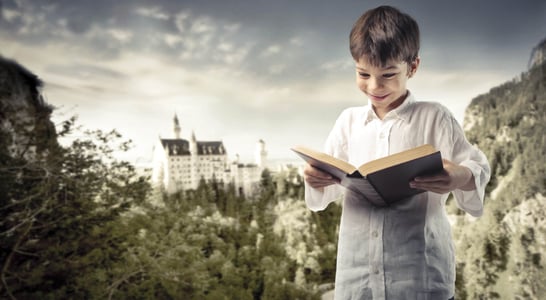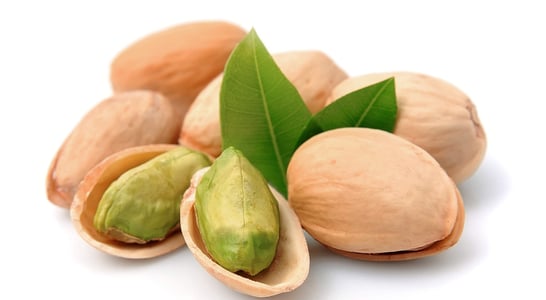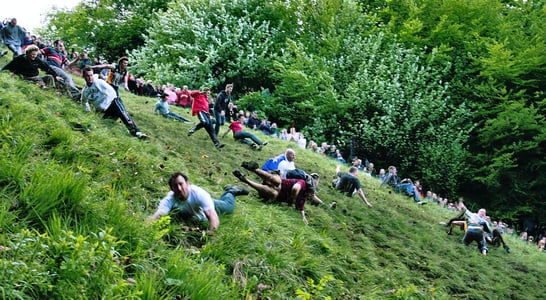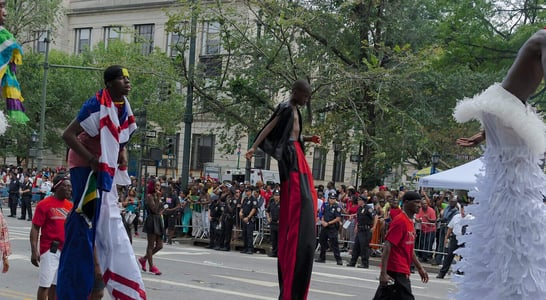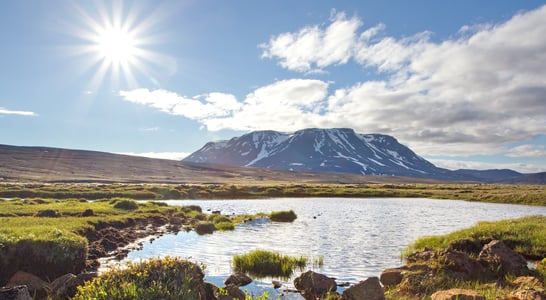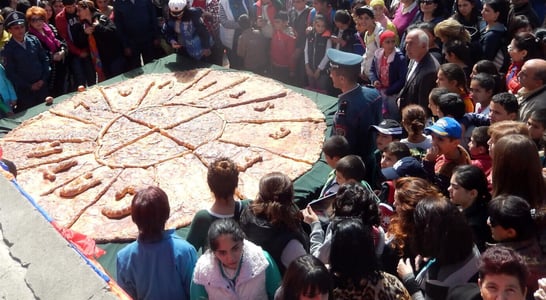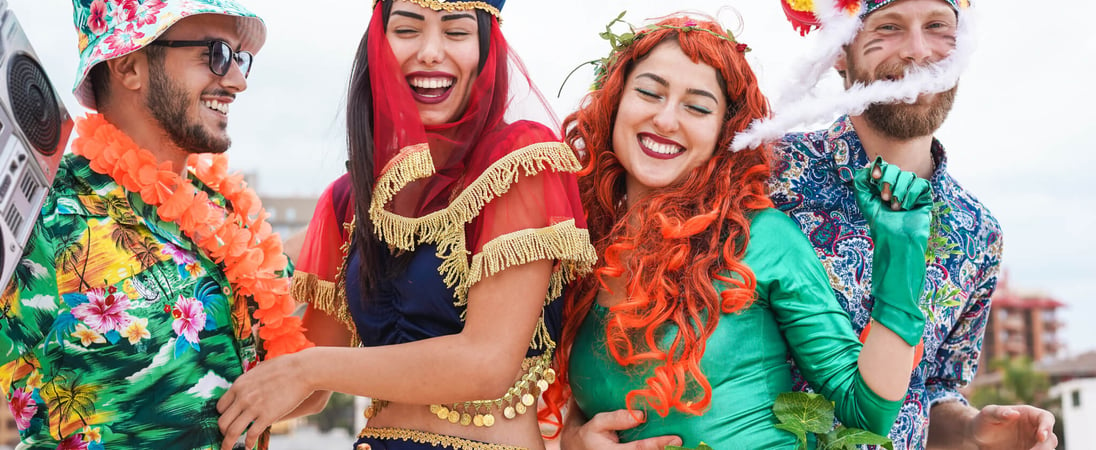
Carnival Day
Carnival Day bursts with life, splashed with vibrant colors and the sounds of merriment. Each year on this day, communities come together to break free from the winter’s grip, diving into a sea of parades, music, and laughter.
This day invites everyone to indulge in fun and food, offering a perfect reason to party and build into some communal joy!
How to Celebrate Carnival Day
Step Right Up to the DIY Carnival
Who doesn’t love the whimsy of turning their home into a carnival wonderland? Set up a Popcorn Cupcake Stand to enchant your guests.
Add yellow-dyed mini marshmallows to ordinary cupcakes to transform them into popcorn replicas. Complete with popcorn bucket wrappers for the full effect.
Get Crafty with Colors
Brighten up the festivities with a Tie-Dye T-shirt station. Provide guests with plain white T-shirts, rubber bands, and a variety of colorful dyes. Watch as everyone twists and dyes their way to creating vibrant, one-of-a-kind shirts.
Games Galore
No carnival is complete without games. Try Bean Bag Toss by setting up a ladder and challenging guests to throw bean bags onto the rungs. For a fun twist, create a Mini Pig Race game where kids can race small plastic pigs down a ramp.
Snap a Memory
Add a DIY Photo Booth with a carnival flair. Set up a backdrop, provide props like oversized glasses, funny hats, and feather boas, and let your guests snap hilarious photos to remember the day.
Significance of Carnival Day
Carnival Day is rooted in a deep-seated tradition of ushering in spring and pre-Lenten festivities. Its purpose extends beyond mere entertainment; it fosters social cohesion by bringing diverse groups together.
Whether it’s the grand spectacles seen in New Orleans or the more intimate, community-focused celebrations in towns like David, Panama, Carnival Day serves as a universal pause for joy and unity before the reflective period of Lent begins.
Around the world, the ways people celebrate vary, with influences from local cultures and histories enriching the experience.
In places like the Dominican Republic, Carnival is intertwined with national identity, displaying elaborate costumes and unique traditions that reflect a rich cultural tapestry.
Meanwhile, in Argentina, the festivities were reinstated as national holidays to ensure everyone can partake in the revelry that marks the season’s climax.
History of Carnival Day
International Carnival Day is a vibrant celebration that captures the spirit of merrymaking before the Lenten season begins.
This global festivity has ancient roots, tracing back to pagan times and evolving through medieval European customs. Traditionally, Carnival was a time for indulgence and revelry, marking the days leading up to Lent, when people would abstain from meat and other pleasures.
The term “Carnival” itself is believed to come from the Latin phrase “carne levare” or “carnelevarium,” which means to remove or take away meat, signifying the onset of Lent’s fasting period.
These festivities feature a rich blend of cultural traditions prominently influenced by European colonial histories and the indigenous and African cultures of the Americas.
For example, the Brazilian Carnival, with its iconic samba music and dance, reflects this deep intermingling of traditions and has become a defining celebration of national identity.
Carnivals around the world vary greatly in their practices and cultural significance. From the masked balls and elaborate parades of Venice to the colorful and rhythmic celebrations of the Caribbean, each brings a unique flavor to this global phenomenon.
In many places, carnivals have evolved into significant tourist attractions that offer a glimpse into local traditions. These festivities not only provide entertainment but also foster a sense of community and cultural pride, making International Carnival Day a true celebration of cultural diversity and joy worldwide.
Carnival Day FAQs
What are some of the earliest records of carnival celebrations?
The origins of Carnival trace back to ancient Roman festivals like Saturnalia, where people wore masks and reveled in the streets.
In medieval Europe, Carnival became a “farewell to meat” (from the Latin carne vale), as people prepared to fast for Lent.
This tradition slowly evolved into the colorful carnivals we know today. Some early written records from Venice show elaborate celebrations by the 13th century.
What’s the strangest Carnival tradition from around the world?
In Ivrea, Italy, locals throw oranges at each other in the “Battle of the Oranges” during Carnival.
This unusual tradition represents an ancient rebellion. Participants, dressed as noblemen or rebels, reenact a battle, hurling oranges as symbols of “cannonballs.”
It’s a unique mix of food fights and historic reenactment!
How do people in Bolivia celebrate Carnival differently?
Bolivian Carnival, especially in Oruro, is known for its mix of Indigenous and Catholic traditions.
During the festival, thousands parade in costumes representing different characters, including devils, saints, and Andean gods.
The highlight is the “Diablada” (Dance of the Devils), where dancers perform wearing elaborate devil masks, symbolizing the fight between good and evil.
What common misconception do people have about Carnival?
Many think Carnival only happens in Rio, Brazil, or Venice, Italy. In fact, Carnival celebrations exist across Europe, the Americas, and even Africa.
Each location brings unique dances, costumes, and rituals, making Carnival a global celebration with many local flavors.
Is there a Carnival celebration in winter?
Quebec City, Canada, hosts a famous winter Carnival! People enjoy snow sculptures, ice canoe races, and other frosty fun.
The festival began in 1894, giving people a way to beat the winter blues. Its mascot, Bonhomme, a smiling snowman, is as iconic as Santa Claus to locals.
What foods are traditionally eaten during Carnival?
Carnival foods vary, but sweet fried treats are common. In Italy, chiacchiere—crispy fried dough dusted with sugar—are popular. In Germany, they enjoy Berliner Pfannkuchen (similar to jelly doughnuts).
New Orleans residents indulge in king cake, a colorful, ring-shaped cake with a hidden plastic baby figurine inside.
What unusual roles do masks play in Carnival?
Masks allow people to escape societal roles and blend into the crowd temporarily.
Venetian Carnival masks, for example, let nobles and commoners mingle without judgment.
Each mask style has a meaning—like the Bauta, which covers the entire face and symbolizes mystery, and the Moretta, worn by women to represent silence and mystery.
Are there any Carnival superstitions?
In some places, people believe Carnival can influence luck for the year. In Nice, France, people believe that dressing up in bright costumes wards off misfortune.
In Haiti, dancers often wear clothes in specific colors, like blue, to protect against negative spirits, blending local superstitions with the festivities.
How did Carnival influence modern festivals and pop culture?
Carnival-inspired events like Mardi Gras in New Orleans, where similar parades, masks, and beads reflect the spirit of Carnival.
Even the idea of “dressing up” and letting loose inspired festivals like Burning Man and Comic-Con, where costume play and freedom of expression take center stage.
What animals play a role in Carnival celebrations?
In the Caribbean, goats are often part of Carnival celebrations, symbolizing fertility.
In certain Brazilian Carnivals, participants dress as large birds and perform dances that mimic the animal’s movements, honoring Indigenous beliefs and nature’s role in life cycles.
See what else is happening…
There’s always more going on every month at Days Of The Year. Here are our favorites this month!
Also on ...
View all holidaysNational Tell A Fairy Tale Day
Once upon a time, magical stories of princesses, knights, and talking animals filled our hearts with wonder and imagination.
National Pistachio Day
A nutritional powerhouse, these little green treats can improve your heart health and reduce inflammation.
Levi Strauss Day
In the hustle of Gold Rush, this sharp-minded innovator stitched together a sturdy solution for prospectors' fashion woes, forever altering attire.
National Pink Shirt Day
Be the one who stands up for kindness and respect. Together, we can make a difference and create a world without bullying.
